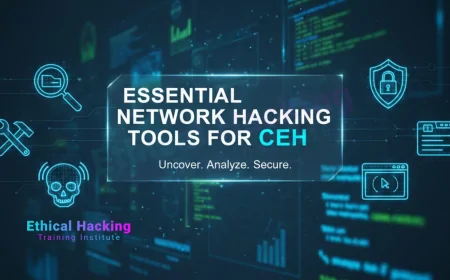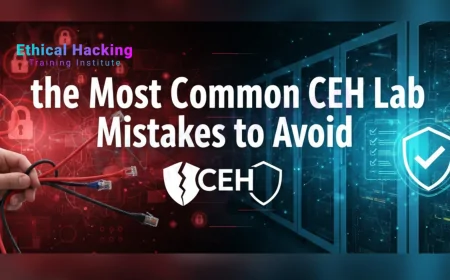Ethical Hacking Full Course: Learn to Hack and Protect Systems Like a Pro | Ultimate Ethical Hacking Bootcamp: Learn to Hack and Defend Like a Professional
Join our Ethical Hacking Full Course and learn to hack systems legally, secure networks, and prepare for CEH and OSCP certifications with hands-on labs.

Table of Contents
- Introduction to Ethical Hacking
- Why Ethical Hacking is Important
- Complete Course Modules Overview
- Top Tools Every Ethical Hacker Must Know
- Skills You Will Learn in This Course
- Career Paths in Ethical Hacking
- Popular Certifications After This Course
- Hands-on Labs and Simulation Environments
- Online vs Offline Training
- Step-by-Step Learning Path
- Live Projects & Practical Scenarios
- Job Assistance and Resume Building
- Future Scope of Ethical Hacking
- Ethical Hacking vs Cybersecurity
- Who Can Join This Course?
- Course Duration and Format
- Best Platforms to Learn Ethical Hacking
- What Makes Our Instructors Special?
- Student Testimonials
- FAQs
- Conclusion
Introduction to Ethical Hacking
Ethical Hacking is the practice of legally breaking into computers and devices to test an organization's defenses. Unlike malicious hackers, ethical hackers follow a structured framework to discover vulnerabilities and help patch them before attackers can exploit them.
Why Ethical Hacking is Important
- Protects Sensitive Data – Ethical hacking helps prevent data breaches and identity theft.
- Improves Security Posture – Organizations learn their weaknesses and can strengthen them.
- Regulatory Compliance – Satisfies industry regulations like PCI-DSS, HIPAA, and GDPR.
- Incident Prevention – Stops cyber attacks before they happen.
Complete Course Modules Overview
This full course covers beginner to advanced levels:
- Introduction to Networking & Cybersecurity
- Information Gathering & Reconnaissance
- Vulnerability Analysis
- System Hacking and Privilege Escalation
- Sniffing, Spoofing, and Social Engineering
- Web Application Hacking
- Wireless Network Attacks
- Cryptography and Encryption
- Malware Analysis
- Penetration Testing Frameworks
Top Tools Every Ethical Hacker Must Know
The course includes tutorials on industry-leading tools such as:
- Nmap – Network scanning and enumeration
- Burp Suite – Web app security testing
- Wireshark – Network packet analysis
- Metasploit – Exploitation framework
- John the Ripper – Password cracking tool
Skills You Will Learn in This Course
- Footprinting and reconnaissance techniques
- Scanning and vulnerability detection
- Manual and automated exploitation
- Post-exploitation strategies
- Cyber forensics basics
- Writing ethical hacking reports
Career Paths in Ethical Hacking
Graduates can become:
- Penetration Tester
- Security Analyst
- Bug Bounty Hunter
- Information Security Manager
- Cybersecurity Consultant
Popular Certifications After This Course
- CEH (Certified Ethical Hacker)
- CompTIA Security+
- OSCP (Offensive Security Certified Professional)
- eJPT (eLearnSecurity Junior Penetration Tester)
Hands-on Labs and Simulation Environments
We offer cloud-based labs through platforms like TryHackMe, Hack The Box, and our custom virtual environments so learners can safely practice in real-time scenarios.
Online vs Offline Training
We provide both options:
- Online – Self-paced modules + live doubt-solving sessions
- Offline – Classroom training with personalized mentoring
Step-by-Step Learning Path
- Understand Networking and OS Basics
- Master Linux and Kali Linux
- Learn Reconnaissance and Scanning
- Practice Exploiting Vulnerabilities
- Work on Real-Life Hacking Labs
- Prepare for Certification Exams
Live Projects & Practical Scenarios
Students will perform:
- Website Penetration Tests
- Wi-Fi Network Attacks
- Social Engineering Simulations
- Bug Bounty Simulations
Job Assistance and Resume Building
We offer:
- Interview prep sessions
- Custom resume creation
- LinkedIn profile optimization
- Direct referrals to cybersecurity firms
Future Scope of Ethical Hacking
With growing cybercrime, ethical hackers are more in demand than ever. Salaries range from ₹6 LPA for freshers to ₹30+ LPA for experienced professionals in India.
Ethical Hacking vs Cybersecurity
| Ethical Hacking | Cybersecurity |
|---|---|
| Offensive approach | Defensive strategies |
| Focus on finding loopholes | Focus on preventing attacks |
| Penetration testing and red teaming | Firewalls, antivirus, blue teaming |
Who Can Join This Course?
- Students (from any stream)
- IT professionals
- Freelancers
- Entrepreneurs
- Security enthusiasts
Course Duration and Format
- Duration: 8 weeks to 6 months (based on level)
- Mode: Online/Offline
- Certificate: Yes, after final exam & project
Best Platforms to Learn Ethical Hacking
- EC-Council (CEH)
- Udemy
- Coursera
- TryHackMe
- Cybrary
What Makes Our Instructors Special?
Our instructors are not just teachers — they are seasoned cybersecurity professionals with deep real-world experience in ethical hacking, penetration testing, and information security consulting.
- Industry-Certified Experts: All instructors hold certifications like CEH, OSCP, CISSP, CompTIA Security+, and eCPPT, ensuring credibility and updated knowledge.
- Hands-On Experience: Each trainer has 7–15 years of experience working on red teaming, threat hunting, and securing enterprise-level infrastructures.
- Real-World Scenario Trainers: They’ve handled live incident responses, vulnerability assessments, and ethical hacking engagements across industries.
- Mentorship-Driven Approach: Beyond teaching, they offer personalized career mentoring, project reviews, and interview prep sessions.
- Up-to-Date with the Latest Threats: Instructors stay current with zero-day vulnerabilities, exploit kits, and modern attack vectors, often contributing to CVE databases or bug bounty programs.
- Global Exposure: Many of our instructors have worked with Fortune 500 companies, government agencies, and international SOC teams.
With such qualified instructors, you're not just learning ethical hacking theory — you're gaining insights from the battlefield of cybersecurity itself.
Student Testimonials
“This course gave me hands-on experience and the confidence to crack interviews. I'm now working as a Penetration Tester at a top firm.” – Ravi S., Pune
“The labs and projects were better than any YouTube tutorials. Completely practical and up-to-date!” – Anjali M., Bengaluru
FAQs
1. What is Ethical Hacking?
Ethical hacking is the authorized practice of testing computer systems, networks, or applications to identify and fix security vulnerabilities before malicious hackers can exploit them.
2. Is Ethical Hacking legal?
Yes, ethical hacking is legal when performed with permission from the system owner. It helps improve cybersecurity rather than compromise it.
3. Do I need a background in IT to learn ethical hacking?
No. While an IT background helps, this course starts from the basics and is designed for beginners as well as professionals.
4. What tools will I learn in this course?
You’ll gain hands-on experience with tools like Nmap, Metasploit, Wireshark, Burp Suite, John the Ripper, and more.
5. What are the prerequisites for this course?
Basic understanding of computers, networking fundamentals, and familiarity with the internet is enough to get started.
6. Will I get a certificate after the course?
Yes, a recognized course completion certificate is provided after passing the final assessment and completing the capstone project.
7. What career options are available after completing this course?
You can become a Penetration Tester, Security Analyst, Bug Bounty Hunter, Cybersecurity Consultant, or Red Team Expert.
8. Is this course suitable for students?
Absolutely. Many college and university students take this course to build real-world skills and certifications for a future career.
9. Is there any programming required in ethical hacking?
Some scripting in languages like Python, Bash, or PowerShell can be helpful, but it’s not mandatory for beginners.
10. Can I learn this course online?
Yes, the entire course can be completed online with access to video lessons, downloadable resources, and virtual labs.
11. What is the average salary of an ethical hacker?
In India, entry-level salaries start around ₹6 LPA and can go up to ₹30+ LPA with experience. Globally, it ranges from $60,000 to $120,000+.
12. Will I work on real hacking scenarios?
Yes, the course includes multiple hands-on projects simulating real-world attack and defense techniques in safe lab environments.
13. What certifications can I pursue after this course?
You can aim for CEH, OSCP, CompTIA Security+, eJPT, and other globally recognized ethical hacking certifications.
14. Is job placement assistance provided?
Yes, job guidance includes resume building, LinkedIn optimization, interview preparation, and referrals to hiring companies.
15. Can I become a freelancer after completing this course?
Yes, many learners work independently by offering penetration testing services or participating in bug bounty programs.
16. Is ethical hacking in demand?
Yes. With rising cyber threats, companies across industries seek skilled ethical hackers to secure their digital assets.
17. How is this course different from free content on YouTube?
This course offers a structured, comprehensive path with instructor support, certification, labs, assessments, and career guidance that free content often lacks.
18. How long will it take to complete the course?
Depending on your pace, it takes 2 to 6 months to complete the course, including hands-on practice and certification preparation.
19. Do I need a high-end computer for this course?
No, but a system with at least 8GB RAM is recommended to run virtual machines and hacking tools smoothly.
20. Is there lifetime access to the course content?
Yes, you will get lifetime access to the course videos, resources, and lab updates.
Conclusion
If you're passionate about cybersecurity and want to break into the field with real skills, this Ethical Hacking Full Course is your gateway. Whether you are a beginner or already in IT, mastering ethical hacking will elevate your career, boost your income, and let you play a critical role in protecting global digital infrastructure.
What's Your Reaction?
 Like
1
Like
1
 Dislike
0
Dislike
0
 Love
0
Love
0
 Funny
0
Funny
0
 Angry
0
Angry
0
 Sad
0
Sad
0
 Wow
0
Wow
0


















